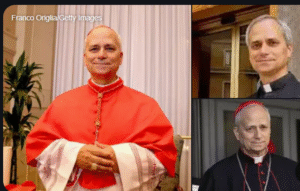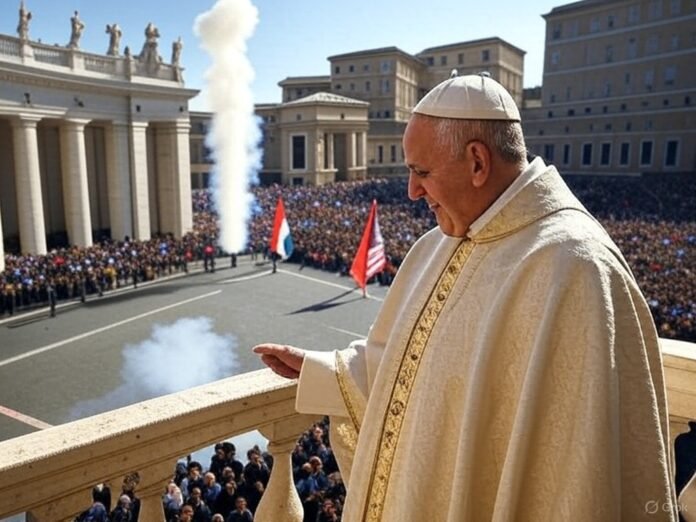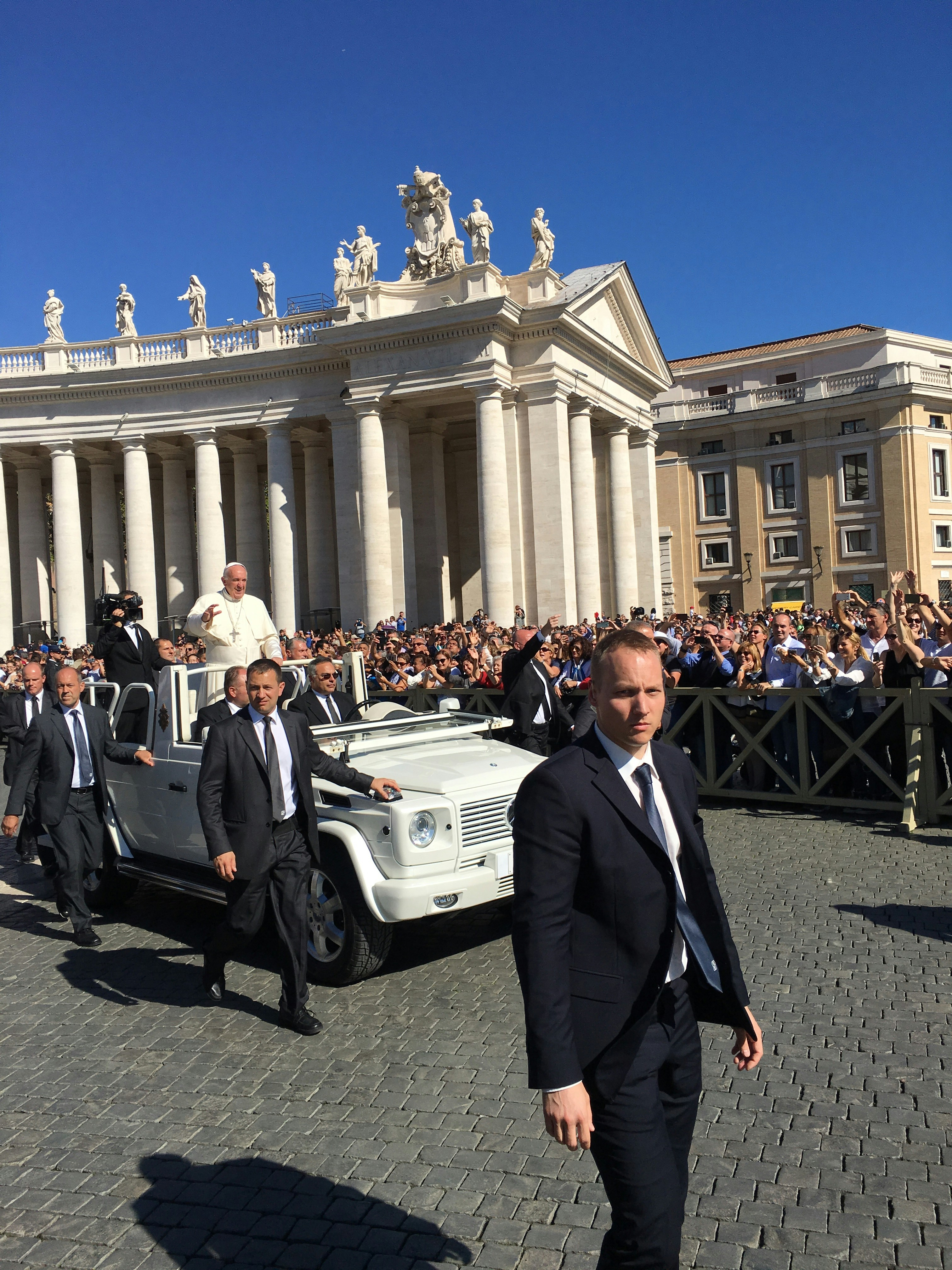Introduction to Pope Leo XIV
The recent election of Robert Francis Prevost as Pope Leo XIV marks a historic moment in the Catholic Church, as he becomes the first American pontiff in its long and illustrious history. This appointment signifies not just a personal achievement for Prevost, but also a transformative shift in the Church’s geographical and cultural representation. The significance of this election extends beyond its novelty; it provides an opportunity for reevaluation of the Church’s role within a rapidly changing global landscape.
Pope Leo XIV’s election is emblematic of the widening acceptance of diverse backgrounds within ecclesiastical leadership. For centuries, the papacy has been predominantly held by European clergy, particularly from Italy. Prevost’s ascension to the papal throne challenges longstanding traditions and reflects the Church’s efforts to resonate more effectively with its growing flocks in the Americas and beyond. His candidacy was bolstered by a strong reputation for pastoral care and a commitment to addressing contemporary issues such as social justice, climate change, and interfaith dialogue, all of which are crucial themes for a modern Church navigating complex societal landscapes.
The implications of his leadership style and vision are vast. Pope Leo XIV’s tenure promises to prioritize inclusiveness and dialogue within the Church, fostering an atmosphere where diverse voices can be heard. This is particularly relevant given the increasing number of Catholics in regions like North America and Latin America, who bring unique perspectives and challenges to the forefront of Church discourse. As the first American pope, his election not only elevates the visibility of the Church in North America but also offers an opportunity to redefine global Catholicism in the 21st century.
Background of Robert Francis Prevost
Cardinal Robert Francis Prevost, recently elevated to the papacy as Leo XIV, has a rich and multifaceted background that has shaped his theological perspective and leadership style. Born in the United States, Prevost’s early life was characterized by a diverse cultural environment that contributed to his strong commitment to unity and dialogue within the Church. He grew up in a family that nurtured a profound faith, encouraging his exploration of religious vocation from a young age.

After completing his early education, Prevost entered the seminary, where he demonstrated exceptional academic and spiritual leadership. His studies encompassed a wide array of theological disciplines, preparing him for a life dedicated to serving the Church. Ordained as a priest, he quickly gained a reputation for his pastoral care and deep understanding of the complexities facing contemporary Catholicism. His early ministry highlights include working within various parishes, engaging with community issues, and facilitating interfaith dialogues.
Prevost’s ascent within the Church hierarchy began as he took on more significant roles, including serving as a bishop in several dioceses. His tenure as a bishop marked a notable emphasis on social justice, education, and pastoral care, reflecting his belief in the importance of addressing modern societal challenges through a faith-based lens. He has been recognized for initiatives that bridge gaps between diverse communities, reinforcing his commitment to inclusivity and dialogue.
Throughout his career, Cardinal Prevost has held various positions in the Vatican, where his influence within the Roman Catholic Church has continued to grow. Notable milestones include representing the Church at international conferences and engaging with global leaders on issues of faith, morality, and ethics. These experiences have contributed significantly to his holistic view of the Church’s role in fostering peace and unity, ultimately leading to his landmark elevation to papacy as Leo XIV.
Ethnic and Cultural Heritage
Pope Leo XIV, born Robert Francis Prevost, carries a rich tapestry of ethnic and cultural heritage that reflects the diversity increasingly found within the leadership of the Catholic Church. His lineage, characterized by a blend of backgrounds, offers a unique perspective on the representation of various cultures in ecclesiastical authority. Born in the United States, Prevost’s family roots can be traced back to significant European influences, particularly from Italy and Spain. This heritage is further augmented by reports suggesting possible connections to Peruvian ancestry, adding another layer of cultural significance to his identity as a leader within the global Church.
The implication of a Peruvian heritage, if confirmed, is noteworthy in terms of representation. The Catholic Church has historically drawn leadership predominantly from European nations. However, with an increasing number of leaders of diverse backgrounds, the appointment of Pope Leo XIV may symbolize a shift towards inclusivity. This embodies a broader recognition of the multicultural dimensions of Catholicism, which thrives across continents, particularly in Latin America. Countries like Peru, where Catholicism intertwines with indigenous traditions, illustrate how faith can be shaped by cultural contexts.
Furthermore, Pope Leo XIV’s ethnic composition carries the potential to bridge gaps between various communities within the Church. As the first American pope, his diverse origins may allow him to serve as a beacon of unity, fostering dialogue among congregations with different cultural backgrounds. It sends a message that the Church’s leadership is becoming more representative of its constituents. As messages of inclusivity and representation resonate globally, the rise of Leo XIV as a figurehead can be viewed as a pivotal moment in the evolution of ecclesiastical leadership, fostering a sense of belonging for countless believers from diverse ethnic backgrounds.
Understanding the New Pope’s Political Views
Robert Francis Prevost, elected as Pope Leo XIV, presents a fascinating amalgamation of political beliefs that could significantly shape his papacy. To categorize his political views as exclusively liberal or conservative would be an oversimplification. Instead, his positions can be seen as fallings within the spectrum of progressive yet pragmatic ideologies, often tailored to complex situations within the Church and the broader societal landscape.
Historically, Prevost has emphasized the importance of dialogue and understanding across different political and cultural divides. He has exhibited a willingness to address social inequalities, a theme often associated with liberal thought. For instance, he has voiced support for issues such as climate change and refugee rights, suggesting a proactive approach to social justice. This aligns him with a generation of church leaders who advocate for an engaged Church that does not shy away from contemporary challenges, reflecting a progressive stance that resonates with many modern Catholics.
Conversely, Prevost acknowledges the significance of tradition and doctrine, which attracts conservative sentiments. His respect for established Church principles may signal a governance style that prioritizes doctrinal integrity while also encouraging adaptation to modern issues. He has stated that the Church must maintain its relevance without compromising its foundations, positioning him as a potential bridge between differing theological viewpoints within Catholicism.
It remains to be seen how these political perspectives will manifest in his leadership as Pope. His inclination towards both progressive social advocacy and steadfast adherence to Church doctrine indicates a balanced approach. Ultimately, Prevost’s identity as Leo XIV could usher in a new era of leadership characterized by collaboration, understanding, and a deep commitment to both faith and societal responsibility.
Reactions to the Election of an American Pope
The election of Robert Francis Prevost as Pope Leo XIV has sparked a wide array of reactions worldwide, encapsulating the diverse sentiments held by church leaders, political figures, and the general public. This unprecedented event, marking the first time an American has ascended to the papacy, has been met with celebration and concern, reflecting the evolving landscape of the Catholic Church and its global influence.
Among ecclesiastical leaders, reactions have varied significantly. Some bishops expressed profound optimism regarding Prevost’s election, emphasizing that his American background might bring fresh perspectives to the Vatican. Cardinal Timothy Dolan of New York stated that an American pope could invigorate the church’s missionary efforts, particularly in regions where Catholicism faces decline. On the other hand, a segment of the clergy maintains skepticism, voicing concerns over the potential for cultural biases to affect decision-making at higher ecclesiastical levels. Church leaders in countries such as Italy and Brazil fear that an American pope might prioritize the interests of the North American church, possibly overlooking pressing issues faced by their congregations.
The political landscape has also shown varied responses to the news of the election. Some U.S. politicians lauded the event as a historic achievement that could bolster international relations and promote dialogue among faiths. Conversely, global leaders from predominantly Catholic countries expressed doubts about the implications of an American pope on international Catholic unity. Analysts suggest that Prevost’s leadership will be scrutinized closely, particularly as he addresses contentious issues such as sexual abuse scandals within the church.
Public reaction has been equally divisive. Many Catholics in the United States are celebrating what they see as a renewing moment for the church, while others question how deeply his American upbringing might shape the future of Catholicism. Overall, the election of Pope Leo XIV is seen both as a potential path toward rejuvenation and as a point of contention that highlights existing divisions within the global Church.
The Role of Pope Leo XIV in Modern Society
The emergence of Robert Francis Prevost as Pope Leo XIV marks a significant moment in the history of the Catholic Church and its relationship with contemporary global issues. With a background steeped in pastoral care and church administration, Prevost has demonstrated a keen awareness of the complexities surrounding modern society. His previous statements suggest a pope who is poised to navigate the diverse challenges the Church faces today.
Pope Leo XIV is expected to adopt a more open and inclusive approach to the contentious issue of LGBTQ rights. Recognizing the need for dialogue, Prevost has shown an understanding that acceptance and compassion are essential in promoting a more inclusive Church environment. His potential to advocate for genuine recognition of LGBTQ individuals within the faith community aligns with a growing movement within various religious bodies that seek to emphasize equality and understanding.
Furthermore, as society grapples with profound inequities, social justice is anticipated to be a key focus during Pope Leo XIV’s papacy. Prevost’s insights derived from his experiences in previously underserved regions may inform his commitment to advocating for marginalized populations. His past engagements suggest that he may actively promote initiatives that address poverty, discrimination, and environmental concerns, thus fostering a church that is actively engaged in humanitarian efforts.
Additionally, spirituality in the context of modernity is another crucial area where Prevost may exert significant influence. His emphasis on a personal faith experience could resonate with a diverse audience seeking deeper connections in an increasingly secular world. By encouraging open discussions on faith that embrace contemporary life’s challenges, he has the potential to inspire a renewal of spiritual commitment among believers.
Through these potential roles, Pope Leo XIV could serve as a bridge between tradition and modernity, fostering dialogues that resonate with the values of compassion and inclusivity. His anticipated papacy reflects a pivotal evolution in the Catholic Church’s response to pressing issues, emphasizing hope and understanding in an ever-changing society.
Historical Context: Has There Ever Been a U.S. Pope?
The elevation of Robert Francis Prevost to the papacy as Leo XIV marks a significant milestone in the ecclesiastical history of the United States. As the first American to assume the role of pope, Prevost’s appointment invites exploration into whether there has been a U.S. pope prior to this occasion. Historically, the papacy has been dominated by European clergy, particularly from Italy, where the Vatican has its origins. The last five centuries have seen an overwhelming majority of popes emerging from European nations, making the papal office an exclusive entity reserved for those within the continent’s church hierarchy.
This appointment is particularly significant for American Catholics, who have long sought representation at the highest levels of the Church. The prospect of a U.S. pope suggests a shift in the cultural and geographical perceptions of the papacy and reflects the global nature of modern Catholicism, where the faith has expanded significantly beyond its historical European roots. Previous papacies have often reflected particular sociopolitical climates; for instance, the election of non-Italian popes has usually occurred in response to evolving dynamics within the Church and its global constituency.
Notably, figures such as Cardinal Timothy Dolan and Cardinal Blase Cupich have been prominently mentioned in discussions surrounding potential U.S. papacies in the past but ultimately did not ascend to the role. Leo XIV’s election underscores an undeniable shift toward inclusivity and representation within Church leadership, encouraging dialogue on matters relevant to the Church’s diverse congregations across the world. The implications of this papacy for American Catholics cannot be understated, as it opens up avenues for new insights, approaches, and understanding of Catholic teachings that may resonate more closely with a North American context.
What to Expect from Pope Leo XIV
The election of Robert Francis Prevost as Pope Leo XIV marks a significant moment in the history of the Catholic Church, given his American background and the unique perspectives he brings to the papacy. Anticipation surrounds his potential initiatives and the priorities he may emphasize during his tenure. One can speculate that Pope Leo XIV may take a progressive stance on various social issues, particularly those involving inclusivity and dialogue with marginalized communities. His understanding of cultural dynamics in the United States could lead to a more open approach towards engaging with diverse groups within the Church.
As a leader who likely embraces the teachings of the Second Vatican Council, it is expected that Pope Leo XIV will prioritize ecumenism and interfaith dialogue. These initiatives could foster unity among different Christian denominations and other religions, addressing the contemporary need for harmony in an increasingly pluralistic world. Furthermore, given the growing concerns about climate change, one can anticipate a stronger emphasis on environmental stewardship, echoing the sentiments of his predecessors while introducing new strategies to galvanize action among the Church’s global community.
Additionally, Pope Leo XIV may focus on revitalizing the Church’s clergy and lay involvement, ensuring that the faithful have a prominent role in church governance and decision-making. This could involve reforms aimed at increasing transparency and addressing issues of clericalism, which have been detrimental to the institution’s credibility. The Pope’s leadership style may emphasize collaboration, seeking input from various stakeholders within the Church to chart its path forward.
In conclusion, it is clear that the papacy of Pope Leo XIV holds the potential for transformative changes within the Catholic Church. His background, experiences, and priorities may guide the Church toward a more inclusive, engaged, and environmentally conscious future.
Conclusion: A New Era for the Papacy
The election of Robert Francis Prevost as Pope Leo XIV marks a significant historical milestone in the Catholic Church, not only as the first American to hold the papacy but also as a symbol of the evolving nature of global Catholicism. Throughout this blog post, key elements surrounding his elevation have been examined, highlighting the broader implications for the Catholic community and its governance.
Pope Leo XIV brings a unique perspective shaped by his diverse experiences within the Church, reflecting a globalized world more than ever before. His appointment suggests a shift towards recognizing the importance of diverse cultural backgrounds in religious leadership. This could foster a greater sense of unity among Catholics worldwide, acknowledging that faith transcends geographical boundaries.
Moreover, his election is indicative of the changing dynamics within the Vatican, demonstrating a willingness to embrace new ideas and approaches in addressing contemporary issues faced by the Church. Given Prevost’s insights into the challenges and opportunities that resonate with modern followers, he is expected to navigate complex discussions around social justice, interfaith dialogue, and the Church’s role in addressing global crises.
As the Catholic Church encounters a myriad of challenges, including declining attendance in certain regions and the need for revitalized outreach efforts, Robert Francisco Prevost’s papacy may initiate a new era focused on inclusivity and renewal. The significance of this transition extends beyond mere geographical representation; it embodies the hope for a more interconnected Catholicism that reflects the voice of its diverse congregation.
In conclusion, Robert Prevost’s ascent to the papacy carries profound implications for the future of the Church. His leadership could champion transformative changes, paving the way for a Catholic Church that embraces its multicultural identity while remaining steadfast in its mission and values.


